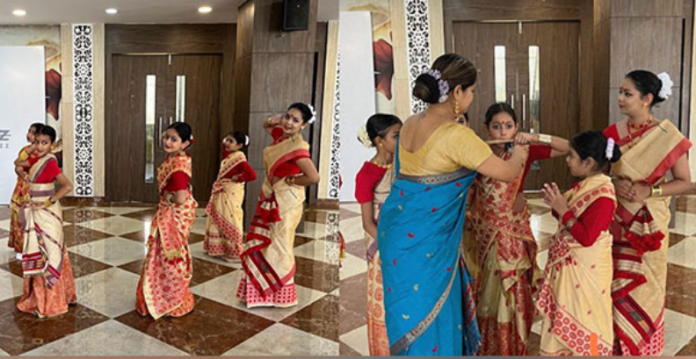As a dance form, Bihu has freed itself from the proverbial ‘four walls’ and has transcended beyond Assam, even making its way into the Guinness Book of World Records.
Bihu etched itself in the Guinness Book after more than 11,000 artistes performed the popular local dance form, which lends to Assam its identity and cultural ethos, in the presence of Prime Minister Narendra Modi at a single venue in the state capital Guwahati back in April, this year.
The event not grabbed eyeballs not just across the country but also overseas.
A folk dance, known for its fast-paced vocals accompanied by local traditional instruments and rendered more eye-catching and dazzling by the vibrant attire and jewellery of the participants, Bihu has generated curiosity among people far beyond the four corners of Assam.
Increasingly, people are showing an interest in learning more about the nitty-gritty of Bihu.

Tanvi Sharma, a danseuse who moved to Delhi-NCR from Assam about a decade ago and runs an academy, organised a week-long dance workshop where she taught some basics about Bihu, among other Indian dance forms, to participants. Over a dozen school-going students, aged from as low as 4 to 13-14 and having no roots in Assam, enrolled themselves to learn this particular dance form.

“I have been running the academy for a few years now. But, this is the second summer that I am organizing such a dance workshop. In the coming years, I intend to make it much bigger,” Tanvi, who runs Dancebuzz, said on the final day of the workshop.
“These days, there are many schools (even in Delhi-NCR) that impart lessons in one or the other form of folk dance as part of their extra-curricular activities. Bihu, too, is being taught in some,” she said.
Besides being taught the intricate moves of Bihu, the participants were made familiar with the folk instruments and traditional jewellery (Gohona) used by Bihu dancers (Bihuwati) while performing.
The participants not only tried to groove to the Bihu beats but also learned to play one of the instruments — Gogona.

Gogona is a tiny stick-like organ made of bamboo and is played only by women. It is played by placing it between the teeth and twanging it with fingers.
Some of the other instruments used in Bihu are Bihu dhol (a special drum used on the occasion), pepa (buffalo hornpipes) and taal (bell-metal cymbals), hutuli (clad-made mouth organ), toka (bamboo-made instrument).

One of the participants, Harshita Goyal, aged about 9, shared her experience saying, “I love Bihu dance because of the colourful attire of the performers.”
Harshita’s mother, who accompanied her to the workshop, said, “She loves Bihu, and for that matter, any dance form. So we encourage her to pursue such activities.”
Shwetangee Thakur, mother of another participant, said she was aware of the Bihu performance that made the Guinness Book, which is what prompted her to send her daughter, Vedanshi Parashar, to the workshop.
Sanwika Singh, another participant who could not take part in the dance performance as she was not wearing the proper attire, however, voiced her willingness to learn it some other time.
“Next year I will try to participate (in Bihu dance),” she said, smiling.





